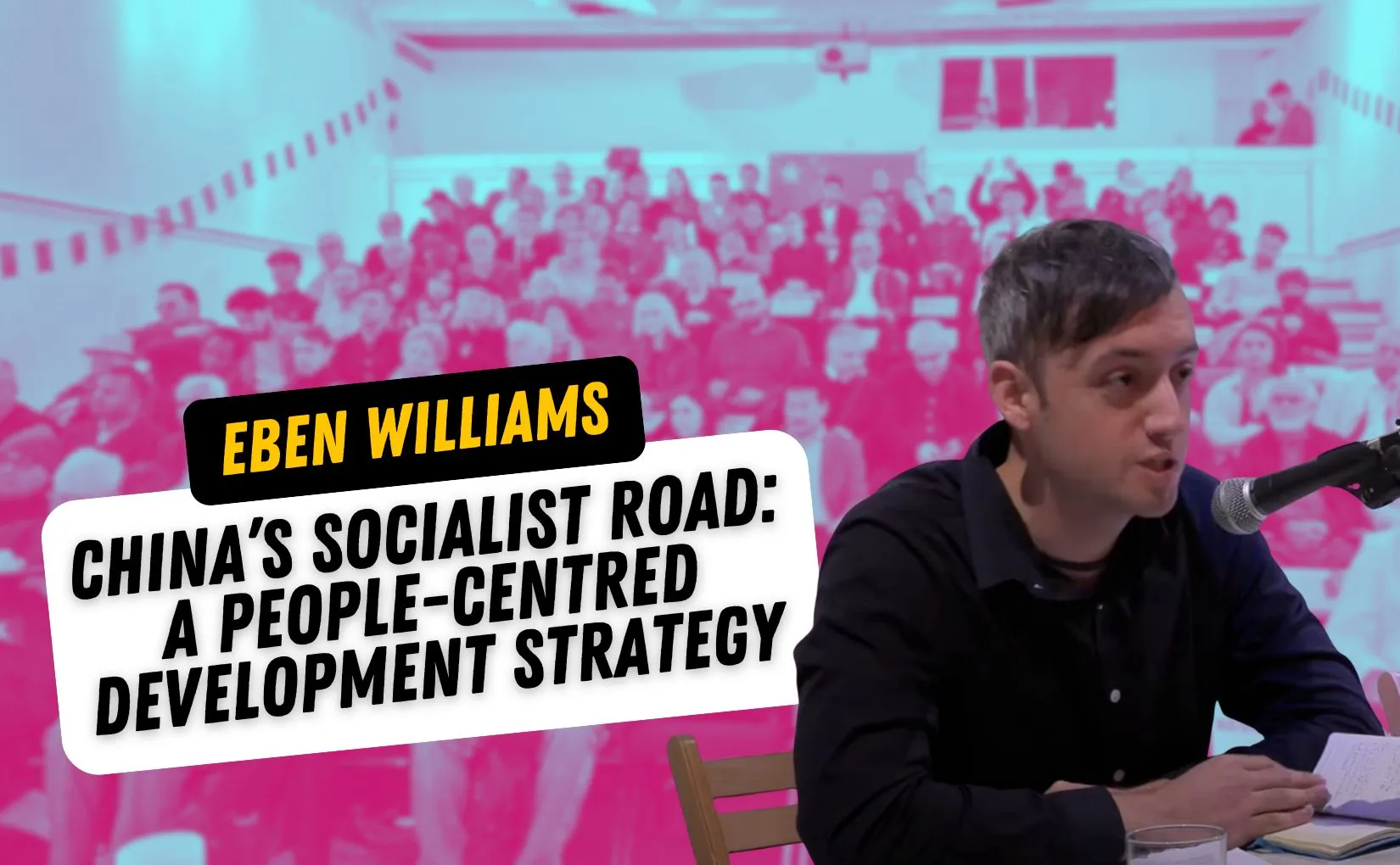☆ Yσɠƚԋσʂ ☆
- 609 Posts
- 807 Comments

 7·1 day ago
7·1 day agoThe whole conspiracy theory started with a claim of millions of Uyghurs being supposedly imprisoned story is based on two highly dubious “studies.”.
However, this claim is completely absurd when you stop and think about it even for a minute. That figure 1 million is repeated again and again. Let’s just look at how much space would you actually need to intern one million people.
This is a photo of Rikers Island, New York City’s biggest prison. The actual size of a facility interning ten thousand people.

According to Wikipedia, “The average daily inmate population on the island is about 10,000, although it can hold a maximum of 15,000.” Let’s assume this is a Xinjiang detention camp, holding ten to fifteen thousand people. How many of these would it take to hold one million people?
Let’s do some math:
Rikers Size Rikers Prisoners One Million Uyghurs Size 413.2 acres (0.645 square miles) 10,000 to 15,000 43 to 64 square miles In reality, one million people would probably take more space; all the supposed detention camps we see are much less dense than Rikers.
For comparison, San Francisco is 47 square miles. Amsterdam is 64 square miles. You’d literally need detention camps that total the size of San Francisco or Amsterdam to intern one million Uyghurs. It’d be like looking at a map of California. There’s Los Angeles. There’s San Diego. And look, there’s San Francisco Concentration City with its one million Uyghurs.
Literally visible to the naked eye from space.

CHRD states that it interviewed dozens of ethnic Uyghurs in the course of its study, but their enormous estimate was ultimately based on interviews with exactly eight Uyghur individuals. Based on this absurdly small sample of research subjects in an area whose total population is 20 million, CHRD “extrapolated estimates” that “at least 10% of villagers […] are being detained in re-education detention camps, and 20% are being forced to attend day/evening re-education camps in the villages or townships, totaling 30% in both types of camps.” Furthermore, it doesn’t even make sense from logistics perspective.
Practically all the stories we see about China trace back to Adrian Zenz is a far right fundamentalist nutcase and not a reliable source for any sort of information. The fact that he’s the primary source for practically every article in western media demonstrates precisely what I’m talking about when I say that coverage is divorced from reality.
Zenz is a born-again Christian who lectures at the European School of Culture and Theology. This anodyne-sounding campus is actually the German base of Columbia International University, a US-based evangelical Christian seminary which considers the “Bible to be the ultimate foundation and the final truth in every aspect of our lives,” and whose mission is to “educate people from a biblical worldview to impact the nations with the message of Christ.”
Zenz’s work on China is inspired by this biblical worldview, as he recently explained in an interview with the Wall Street Journal. “I feel very clearly led by God to do this,” he said. “I can put it that way. I’m not afraid to say that. With Xinjiang, things really changed. It became like a mission, or a ministry.”.
Along with his “mission” against China, heavenly guidance has apparently prompted Zenz to denounce homosexuality, gender equality, and the banning of physical punishment against children as threats to Christianity.
Zenz outlined these views in a book he co-authored in 2012, titled Worthy to Escape: Why All Believers Will Not Be Raptured Before the Tribulation. In the tome, Zenz discussed the return of Jesus Christ, the coming wrath of God, and the rise of the Antichrist.
The fact that this nutcase is being paraded as a credible researcher on the subject is absolutely surreal, and it’s clear that the methodology of his “research” doesn’t pass any kind of muster when examined closely.
It’s also worth noting that there is a political angle around the narrative around Xinjiang. For example, here’s George Bush’s chief of staff openly saying that US wants to destabilize the region, and NED also openly admitted to funding Uyghur separatism for the past 16 years on their own official Twitter page. An ex-CIA operative details US operations radicalizing and training terrorists in the region in this book. Here’s an excerpt:




US has been stoking terrorism in the region while they’ve been running a propaganda campaign against China in the west. In fact, US even classified Uyghur separatists as a terrorist group at one point https://www.mintpressnews.com/us-was-at-war-uyghur-terrorists-now-claims-etim-doesnt-exist/276916/
Here’s an interview with a son of imam killed in Xinjiang https://news.cgtn.com/news/2020-06-19/Son-of-imam-assassinated-in-Kashgar-s-2014-mosque-attack-speaks-out-RqNiyrcRuo/index.html
Here’s an account from a Pakistani journalist who has been all over Xinjiang (which borders Pakistan) claims that western media reports on “atrocities” are lies. https://dailytimes.com.pk/723317/exposing-the-occidents-baseless-lies-about-xinjiang/
It’s also worth noting that the accusations originate entirely from the west while Muslim majority countries support China, and their leaders have visited Xinjiang many times.
- https://www.ctvnews.ca/world/on-eid-xinjiang-imams-defend-china-against-u-s-criticism-1.5425967
- https://www.bolnews.com/latest/2023/07/pak-religious-leaders-nurture-bonds-of-cooperation-with-xinjiang/
- https://morningstaronline.co.uk/article/w/islamic-envoys-say-china-is-protecting-minorities-in-xinjiang-after-five-day-visit
Also notable that whenever western media actually deigns to visit Xinjiang, which is not often, they’re unable to produce support for any of their claims of mass imprisonment and oppression, so they opt for insinuations instead https://apnews.com/article/coronavirus-pandemic-lifestyle-china-health-travel-7a6967f335f97ca868cc618ea84b98b9
There’s a further list of debunking here if you’re interested https://redsails.org/the-xinjiang-atrocity-propaganda-blitz/
The whole thing is very clearly a propaganda blitz that US is cynically using to manipulate impressionable people in the west.

 6·1 day ago
6·1 day agoThe fact that you continue to regurgitate the thoroughly debunked Uyghur genocide narrative shows that you’re a deeply unserious person.

 71·2 days ago
71·2 days agoThat’s a fascinating bit of fiction you’ve spun there. Now, if you actually want to know about real China I can recommend reading this book to educate yourself. https://redletterspp.com/products/the-east-is-still-red
There are lots of different kinds of games out there. If you’re new to games and like puzzles, here are a few I can recommend.
Portal is humorous and has fun puzzles, pretty easy to get into. Viewfinder is another similar type of game, also The Stanley Parable
Baba Is You is a creative puzzle game.
Planet of Lana, and Limbo, and Somerville are neat puzzle/platformer games.
Torchlight us a good example of an action RPG genre, Children of Morta is another.
FTL is a neat roguelike game.
Faeria is a card deck building game.
Turn based tactics games can be pretty fun, and are easy to get into. Triangle Strategy is a good one to try.
I also find narrative driven games really fun. For example, The Wolf Among Us is really excellent. Afterparty is pretty entertaining.
All of these should be fairly easy to get into if you’re just starting gaming.
Sure, if a big instance started to dominate the fediverse it would be a form of centralization. However, the protocol being designed with federation in mind makes it much easier for people to migrate from that instance if it becomes a bad actor.
Going back to the original point though, I do think that fediverse could be marketed better in a way that would appeal to more people. Since we agree that federation is a desirable feature, the focus should be on figuring out how to explain it to people in a sensible way.
Sure, but all of this basically comes down to poor marketing. It’s not an inherent problem with the technology or with the concept of federation.
It shouldn’t be surprising either given that Mastodon is a niche platform developed largely as a volunteer effort. The reason people advocating Mastodon tend to focus on stuff like on the flaws of the centralized social media is because that’s what matters to them. We see pretty much the same thing happening with Linux, and many other open source projects.
This is the point I was making above, BlueSky has a professional marketing team that understands how to sell their product to the general public. That’s the main reason BlueSky is gaining users at a faster rate.
Regarding the Gmail problem, it’s true that we could end up with one major instance most people are on. I don’t see that as a huge issue in practice since you can still choose use different instances. That’s a fundamentally better situation to be in.
For example, I don’t use Gmail and I run my own personal Mastodon instance using masto.host, this doesn’t stop me communicating with people on Gmail or major Mastodon instances like mastodon.social.
What I’m saying is that the amount of friction this adds is completely blown out of proportion. It’s just not that hard, and people acting like it’s a huge barrier are not being serious. If this was the case email would’ve never taken off. The fact that we’re at the point where it’s hard to imagine a regular user going outside a walled corporate garden is really the problem here.
Unfortunately people aren’t as informed and most really just don’t care.
The flip side is that we shouldn’t care too much either. Fediverse already has millions of users, and it can just keep growing organically at its own pace.
I don’t think there’s a lot of evidence that federation is a significant obstacle in practice. Email is a great example of a federated platform that even the least tech literate people are able to use just fine. It could be argued that Mastodon onboarding process could be smoother, but that’s not an inherent problem with it being federated.
In my view, the simplest answer is that BlueSky has much better marketing because it has a ton of money behind it and it’s been promoted by Dorsey whom people knew from Twitter. So, when people started abandoning Twitter, they naturally went to the next platform he was promoting.
I’d also argue that there is a big advantage to having smaller communities of users that focus on specific topics of interest and can federate with each other. In my experience, this creates more engaging and friendlier environment than having all the users on the same server. Growth for the sake of growth is largely meaningless.

 2·3 days ago
2·3 days agoAbsolutely, and there’s actually been a substantial amount of research on the subject as well. The way we perceive time is a product of our emotional state, and the environment.
Yet, the fact remains that people did get comfortable with email, and even the least tech illiterate people are able to use it.
That’s a recent phenomenon though, and it’s effectively been forced on people by the largest email provider making it difficult to use others. My original point was that people didn’t find it confusing to register for different mail providers when that was easy to do.
You don’t have to make an informed decision. Signing up for an instance isn’t a blood pact. If you find the instance you singed up for isn’t to your liking, You can easily migrate your account to another. Meanwhile, if you’re worried about something you don’t align with, then you don’t even get that choice with a centralized platform like Bluesky. For example, I don’t align with any of this shit https://toad.social/@davetroy/113476788536250587
Mastodon being federated is absolutely not a flaw. This is how the internet was meant to work in the first place. The fact that people got used to using centralized platforms is an aberration and this needs to be actively fought against.
How is picking a Mastodon server different from signing up for email, finding a discord server, signing up to follow channels on youtube, and so on. Somehow people have no problems figuring those things out, but when it comes to Mastodon this is constantly brought up like some insurmountable challenge.

 2·4 days ago
2·4 days agoI use Lemmy and Mastodon about equally. I find I like Lemmy for discussions, while Mastodon is good for news just because there are a lot more users overall, and you can follow different news feeds on it.

 2·4 days ago
2·4 days agoThey acted to prevent an issue from developing. This is the whole purpose of having a government. It pays attention to what’s happening in the country overall, and guides the economy towards positive outcomes.

 81·8 days ago
81·8 days agoI did not come up with a reductive definition, and I linked you a detailed explanation of what socialism actually is and its relation to communism. You never addressed that, and just continued to spam your wiki link. You’re like a poster child for the Dunning-Kruger effect.
















As a matter of fact, I do have this sitting around because it’s a trope that just won’t die and I got tired of having to look up these points every time somebody brings this up.